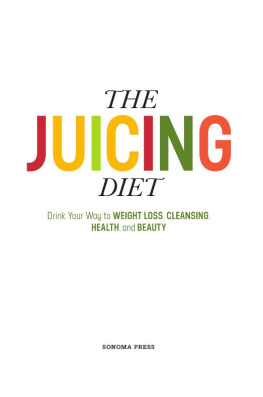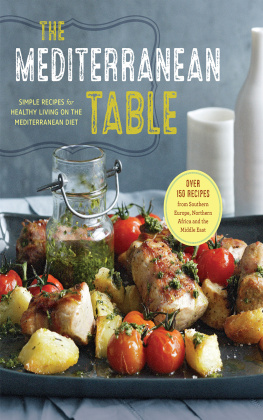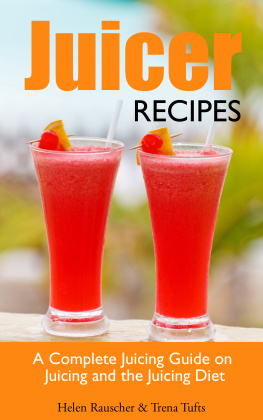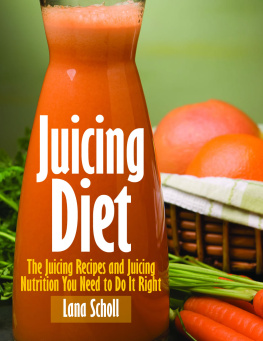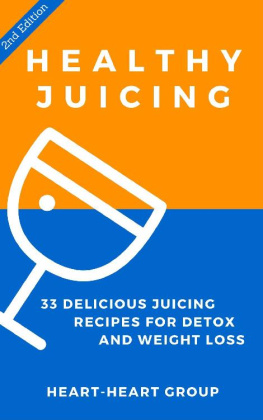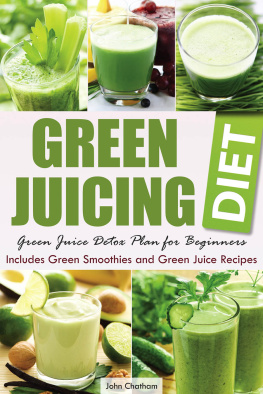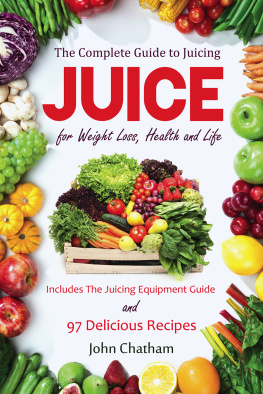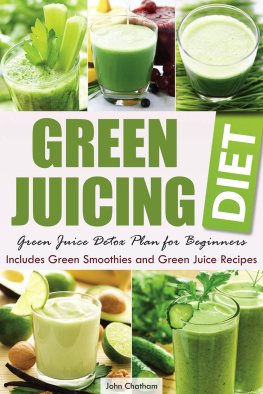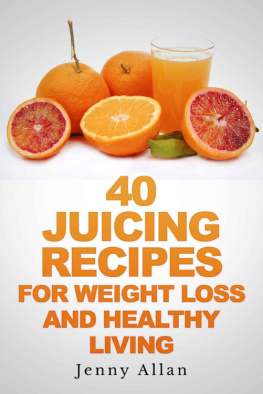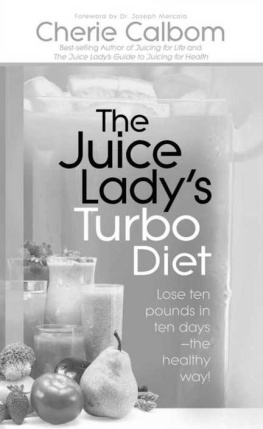THE JUICING DIET


Copyright 2013 by Sonoma Press, Berkeley, California
No part of this publication may be reproduced, stored in a retrieval system, or transmitted in any form or by any means, electronic, mechanical, photocopying, recording, scanning, or otherwise, except as permitted under Sections 107 or 108 of the 1976 United States Copyright Act, without the prior written permission of the publisher. Requests to the publisher for permission should be addressed to the Permissions Department, Sonoma Press, 918 Parker St, Suite A-12, Berkeley, CA 94710.
Limit of Liability/Disclaimer of Warranty: The publisher and the author make no representations or warranties with respect to the accuracy or completeness of the contents of this work and specifically disclaim all warranties, including without limitation warranties of fitness for a particular purpose. No warranty may be created or extended by sales or promotional materials. The advice and strategies contained herein may not be suitable for every situation. This work is sold with the understanding that the publisher is not engaged in rendering medical, legal, or other professional advice or services. If professional assistance is required, the services of a competent professional person should be sought. Neither the publisher nor the author shall be liable for damages arising herefrom. The fact that an individual, organization, or website is referred to in this work as a citation and/or potential source of further information does not mean that the author or the publisher endorses the information the individual, organization, or website may provide or recommendations they/it may make. Further, readers should be aware that websites listed in this work may have changed or disappeared between when this work was written and when it is read.
For general information on our other products and services or to obtain technical support, please contact our Customer Care Department within the United States at (866) 744-2665, or outside the United States at (510) 253-0500.
Sonoma Press publishes its books in a variety of electronic and print formats. Some content that appears in print may not be available in electronic books, and vice versa.
TRADEMARKS: Sonoma Press and the Sonoma Press logo are trademarks or registered trademarks of Arcas Publishing, and/or its affiliates, in the United States and other countries, and may not be used without written permission. All other trademarks are the property of their respective owners. Sonoma Press is not associated with any product or vendor mentioned in this book.
Photo Credits: StockFood/Yelena Strokin, p.iv; StockFood/Westend61, p.8; StockFood/Tanya Zouev, p.108; StockFood/Victoria Firmston, pp.129, 265, 212, 315; StockFood/Anita Brantley, p.137; Stock-Food/Westend61, p.140; StockFood/Oliver Brachat, p.149; StockFood/Kent Lacin, p.152; StockFood/ Danya Weiner, p.157; StockFood/Sporrer/Skowronek, p.160; StockFood/Liv Friis, p.178; StockFood/ Klaus Arras, p.188; StockFood/Martina Schindler, p.204; StockFood/Foodcollection, p.220; Stock-Food/Frank Adam, p.228; StockFood/Louise Lister, p.233; StockFood/Petr Gross, p.244. StockFood/ Allison Dinner, p.249; StockFood/Jacqui Albi, p.260; StockFood/Maja Smend, p.276; StockFood/Valerie Janssen, p.318; all other photographs www.shutterstock.com
ISBN: Print 978-0-9895586-0-0
Content
Introduction
W hat would you say to someone who claimed to have consumed two cups of spinach, two carrots, a large stalk of celery, and a whole apple without taking a single bite?
What about someone who told you he or she took in an entire day's worth of vitamins and minerals in a single meala meal that wasn't significantly bigger than an average meal?
Would you believe it if someone told you he or she consumed more than 50 grams of healthful carbohydrates, protein, and fiber without taking in more than 2 or 3 grams of fat?
If none of these instances seem possible to youor if they seem completely ridiculousdon't worry. You aren't going crazy; you simply may not be familiar with one of the latest trends in the world of health and fitness. Juicing has taken the wellness world by storm and is quickly gaining recognition as one of the simplest yet most beneficial changes you can make in your diet. All three of the claims made above can be realized in a single glass of fresh, home-pressed juice.
What is it about a fresh glass of juice in the morning that simultaneously quenches your thirst and wakes you up, making you ready to seize the day? While these effects may, to some degree, be psychological, there is a great deal of scientific evidence to support the idea that fresh juice is a healthful way to start the morning. Fresh juice is loaded with vitamins, minerals, and live enzymes that help nourish your body and keep it functioning at its optimal level. Not only is fresh juice a good source of nutrition, but it provides a number of other significant health benefits as well.
The juicing trend is sweeping the nationit seems as though a new juice cleanse or detox hits the newsstands every few weeks. You may be tempted to think that juicing is just another fad diet, destined to fade along with the rest of them. The reality, however, is that the health claims associated with juicing have been supported by numerous medical studies. There are countless professionals in the medical and nutrition fields who support juicing as a means of supplementary nutrition.
With these facts in mind, you may find yourself making a trip to the grocery store to fill your cart with bottles of fruit and vegetable juice. Before you head to the checkout counter, consider this: bottled juices are pasteurized in a process that alters the juice nutritionally. In raw form, fruit and vegetable juices contain valuable vitamins, minerals, enzymes, and other nutrients that can be altered or destroyed through pasteurization. This affects the taste as well. If you've ever made your own fresh-squeezed orange juice at home, you've probably noticed how different it tastes from the stuff in a carton. Much of that difference can be attributed to those same vitamins, minerals, and enzymes that are destroyed in the pasteurization process. Why would you want to drink something that has had such a significant portion of its nutritional value chemically removed?
This is not to say that bottled juices are bad for youthey're simply a mediocre version of the real deal. Fresh-pressed juices are loaded with vitamins and mineralsnot to mention authentic flavorthat can have a significant impact on your health and well-being. Numerous medical studies have provided evidence to support the idea that the consumption of raw juice helps boost the body's immune response, reduce the risk for chronic disease, and improve skin and hair health. Juicing has been associated with decreased inflammation, healthful weight loss, increased energy levels, and more. The results speak for themselves: juicing is a healthful way of life for anyone and everyone who is willing to give it a shot.
The Benefits of This Book


